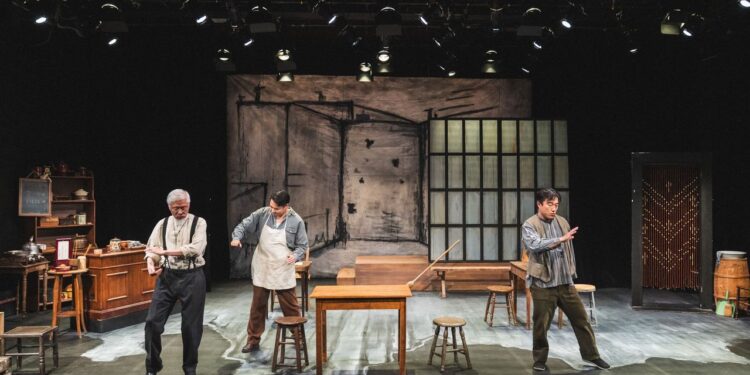(One time guest contributor: Debra J.Hale)
Strong performances anchor a play about an unfortunate history
In this revision of Winston Kam’s 1987 play, I knew I would hear stories of how Chinese men who came to Canada to build our country were banned from having their wives and families join them by an archaic and cruel Canadian law. Dominion Day became known as ‘Humiliation Day’ and was not one to celebrate for these bachelors. One can’t help but think about modern immigration policies that separate families and the current anti-immigrant sentiment visiting almost every continent. It’s disturbing and it’s a part of our past. But there is more unexpected richness to this historical drama.
Early on in the play, the Toronto tea shop owner John (George Chaing) explains that the Chinese were good at so many things that Canadian laws were created to force ‘them’ into women’s jobs – laundry and restaurants. A sobering thought that reveals the gender issues I wasn’t expecting to be dealt with so deeply.
Set in 1929, it was hard to hear characters speak about the Chinese girl babies tossed on garbage heaps and hearing the bachelors bemoan the loss of their ‘rice cookers’ (derogatory term for their female companions). How important were those women to the bachelors after all? Were they valued? Were they treated well?
Each character’s story is teased out by the script that’s explored by strong actors. In the first act the challenging role of war vet Kao was powerfully inhabited by Sean Baek. A damaged and self-pitying man, Baek doesn’t shy away from the drunken whining which is integral to his character and to the plot’s pivotal moments. When a married coffee shop woman enters the tea house we see his longing, his desperation and her uncomfortable shyness. She is beautifully portrayed by Renee Wong. Kao’s friend Huangfinds a different way to cope and he is played with haunting subtlety by Ziye Hu. The juxtaposition of their stories gives us a look into a history that is shocking and revealing. Indeed all the actors have moments to reveal who they are, whether hanging onto tradition or hoping for change but feeling hopeless to bring it about.
With the characters well established in Act One, Act Two really brings the power of the stories home. We are introduced to an older, wiser woman whose life of bound feet and misery led her to seeing and speaking the truth. At times this broken human reminded me of a Shakespearean ‘fool’ – the way she is mistreated and then cajoled to stay and tell them more. The way she makes us laugh. Brenda Kamino is riveting as Queenie and one of her bigger speeches brought me and many of the audience to tears.
The audience cheered at the end of this play as the little-known part of our history had been explored and will live with us for some time.
The production runs to September 14 on the Mainstage at Tarragon Theatre















